UPDATED: This story was updated on Feb. 16 at 12:43 p.m. CST to include information on the Dores Divest “Climate walkout.” This story was further updated at 2:30 p.m. to include a university response to the allegations.
Members of Dores Divest filed a legal complaint on Feb. 16 with Tennessee Attorney General Herbert Slatery III in conjunction with attorneys at the Climate Defense Project. The complaint alleges that Vanderbilt’s Board of Trust violated specific non-profit institution investment requirements due to their investments in the fossil fuel industry and their failure to consider board members’ potential conflicts of interest regarding fossil fuel industry connections.
Yale, Stanford, Princeton and MIT filed similar legal complaints with their respective state attorney generals today, per a Washington Post article published on Feb. 16 at 7:54 a.m. CST.
“We don’t have time to wait for Vanderbilt to get its act together on climate,” second-year graduate student and Dores Divest member Miguel Moravec said. “The law is clear, and whether the order comes from Chancellor Diermeier or the Attorney General, Vanderbilt’s divestment from fossil fuels is now inevitable.”
Allegations
The complaint states that Vanderbilt’s Board of Trust is a non-profit organization and qualifies as a “charitable corporation” under Title 48, Chapter 51 of the Tennessee Code. Due to this classification, the Board is subject to specific considerations for their investments under the Tennessee Uniform Prudent Management of Institutional Funds Act (TUPMIFA), per the complaint.
The complaint alleges that TUPMIFA requires “an asset’s special relationship or special value, if any, to the charitable purposes of the institution” to be considered in investments and that investments be made with “good faith” and prudence. The investigation claims that, by investing in fossil fuels and, thus, “supporting the degradation of the climate,” the Board of Trust fails to uphold its charitable obligations. It further alleges the Board of Trust’s violated its “good faith” by investing in fossil fuels as they face a potential “general collapse in value.”
“Investment in the fossil fuel sector is now unacceptably risky thanks to price volatility, the rise of renewable energy sources, and government climate regulations,” the complaint reads.
Using the university financial report and information from various investment groups and strategy funds, the complaint estimates that Vanderbilt’s fossil fuel investment is $506 million. The Hustler has not been able to independently verify this amount. The 2021 fiscal year (FY) endowment return marked a 57% increase from 2020 FY and had a value of over $10.3 billion. However, the report does not note what returns come from what investments and the university does not otherwise publish specific investment amounts.
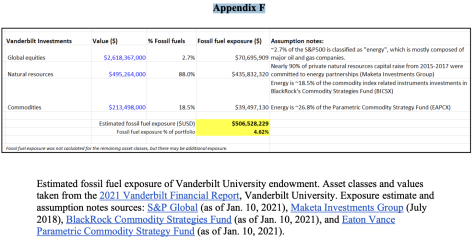
“The Board of Trust is bound by an additional legal duty: the requirement to manage Vanderbilt’s assets with prudence,” the complaint reads. “Prudent investment practice cannot be squared with the ownership of fossil fuel assets.”
The university and the Board of Trust have not responded to immediate requests for comment.
In addition to the 27 Dores Divest student signatories, multiple alumni, community members and scholars across the country signed on to endorse the complaint. These supporters include Former U.S. Senator Timothy Wirth, former Commissioner of the U.S. Securities and Exchange Commission Bevis Longstreth, MIT professor emeritus and linguist Dr. Noam Chomsky and a myriad of climate science and policy activists. Longstreth’s work helped draft the original TUPMIFA legislation in 2006.
The complaint was further endorsed by Vanderbilt’s chapter of the American Association of University Professors, Divest Princeton, Fossil Free Stanford, Fossil Free Divest Harvard, Vanderbilt Students Promoting Environmental Awareness & Responsibility (SPEAR), Yale Endowment Justice Coalition and other organizations.
Both Harvard and Cornell submitted legal filings to their respective state attorney generals, but no investigations were opened before the universities announced divestment decisions, per the Climate Defense Project.
The university called the complaint a “coordinated publicity and pressure campaign” drawing attention to the near-identical filings against other universities.
“We take our fiduciary responsibilities and Tennessee state law seriously. Any allegations to the contrary have no merit,” the response reads. “Our ultimate goal for the endowment is to maintain healthy growth to support the university’s educational, research and service mission.”
Conflict of interest claims
The complaint further claims that alleged conflicts of interest (COIs) created by Trustees’ personal ties to the fossil fuel industry are violations of institutional “loyalty” and “good faith” investments required under TUPMIFA.
A university complaint was filed on Jan. 30 with Vanderbilt’s Office of COI and Commitment Management alleging a COI violation against Chancellor Daniel Diermeier given his consulting relationships with fossil fuel companies. The Board of Trust’s Audit Committee conducted an investigation, and, on Feb. 9, the committee released that it found no evidence of Diermeier having a COI.
“The committee found that Chancellor Diermeier properly and fully disclosed all relevant information in the course of the extensive due diligence process related to his appointment,” the press release reads.
Per Vanderbilt policy, a COI occurs when an individual’s responsibilities to two or more groups create a clash between personal interests and professional judgment. The complaint filed against Diermeier stated concerns regarding his outside work “in the areas of crisis management, business and politics, reputation management, political, and regulatory risk and integrated strategy” for Shell, ExxonMobil, BP and other gas companies.
Isaiah Maynard, a sophomore representative of Dores Divest who supported the initial complaint, said he wanted a greater explanation of the COI decision.
“[The press release] was definitely ambiguous and unsatisfactory. I think it’s important that they [the Audit Committee] release a more thorough version that offers more insight into their thought process and what led to the decision they made,” Maynard said. “As of now, it isn’t clear how they reviewed what we presented and interpreted that Diermeier does not exercise a conflict of interest.”
Jerry Chen, a first-year who is not involved in Dores Divest, agreed with Maynard’s request for more information.
“People find this topic important,” Chen said. “So, if they [the Board of Trust] disclose the matter, they should have at least provided more details.
The members of the Board of Trust Audit Committee were not publicly released. The Board of Trust has not responded to The Hustler’s request for comment regarding this matter and their decision. It is unclear if this legal filing will spur subsequent COI investigations.
Climate walkout
In the wake of their most recent legal filing, Dores Divest organized a climate walkout at 12 p.m. CST in front of Rand Dining Hall. The protest opened with a discussion of the complaint and then opened the stage for students to express the reasoning behind their support of the movement. It ended with a march to Kirkland Hall. Moravec led the crowd in chanting, “Climate justice,” “Diermeier who,” “Fossil fool” and “Anchor down, Lawyer up.”
First-year member of Dores Divest Michael Chyobotov emphasized how the university’s investment in fossil fuels directly contradicts the promises of Vanderbilt organizations. He cited the Student Center for Social Justice and Identity’s commitment to increasing “intercultural competence and social justice” as well as the Chancellor’s own remarks that climate change is “one of the most serious threats faced by humanity today” as examples.
Other students spoke about the COI filing against Diermeier, claiming that it took the university longer to investigate Dores Divest’s placement of stickers around campus than it did to investigate the COI. They dubbed the Board of Trustees Audit Committee a “kangaroo court” and highlighted members’ alleged ties to the fossil fuel industry.
“We want this change. We need this change. We will make this change,” sophomore member of Dores Divest Scott Burns said at the protest.
This piece will be updated as more information becomes available.


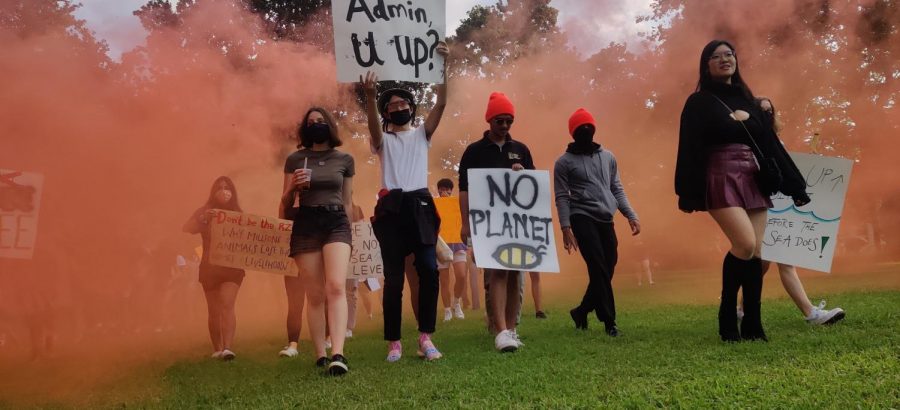



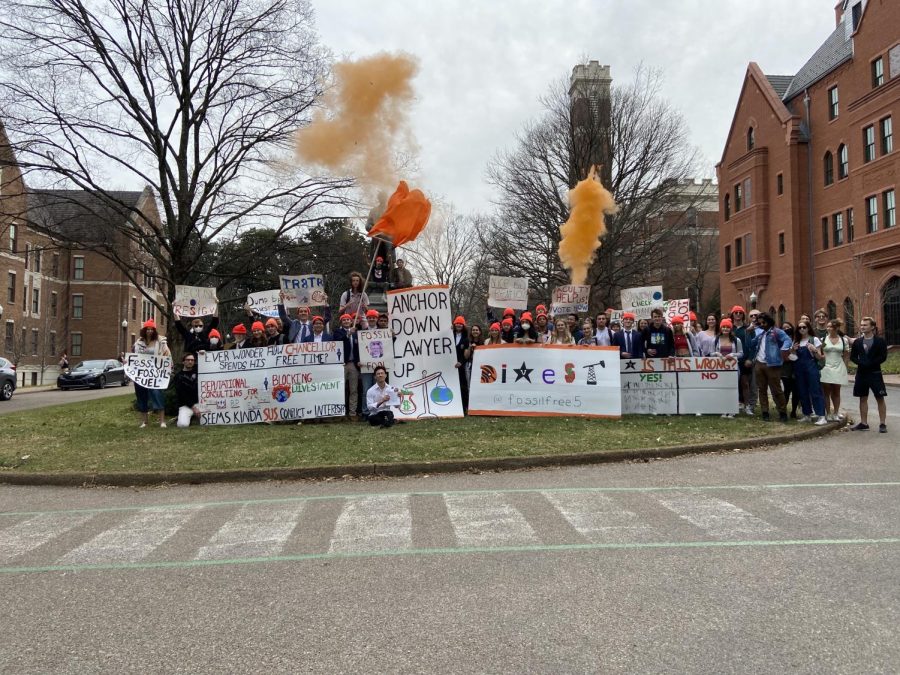






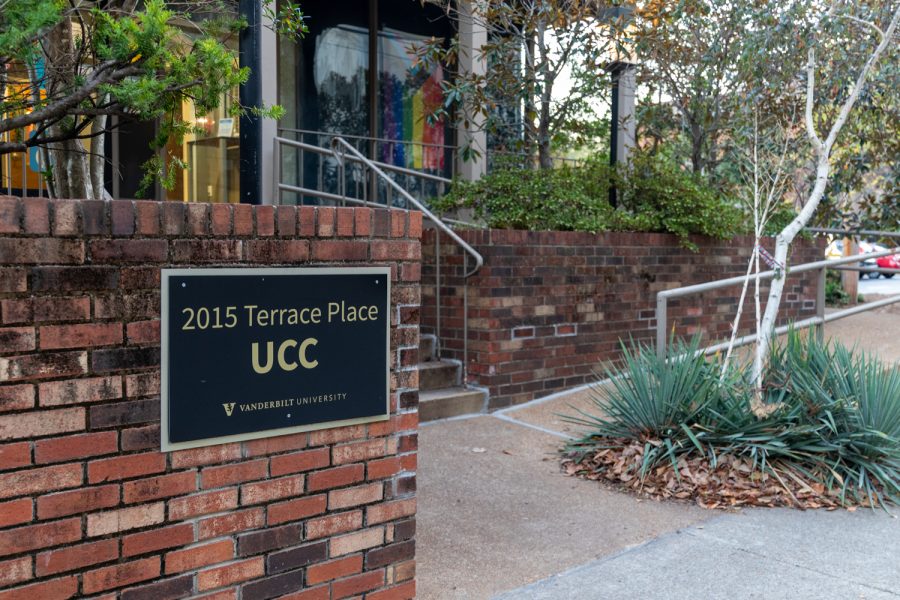



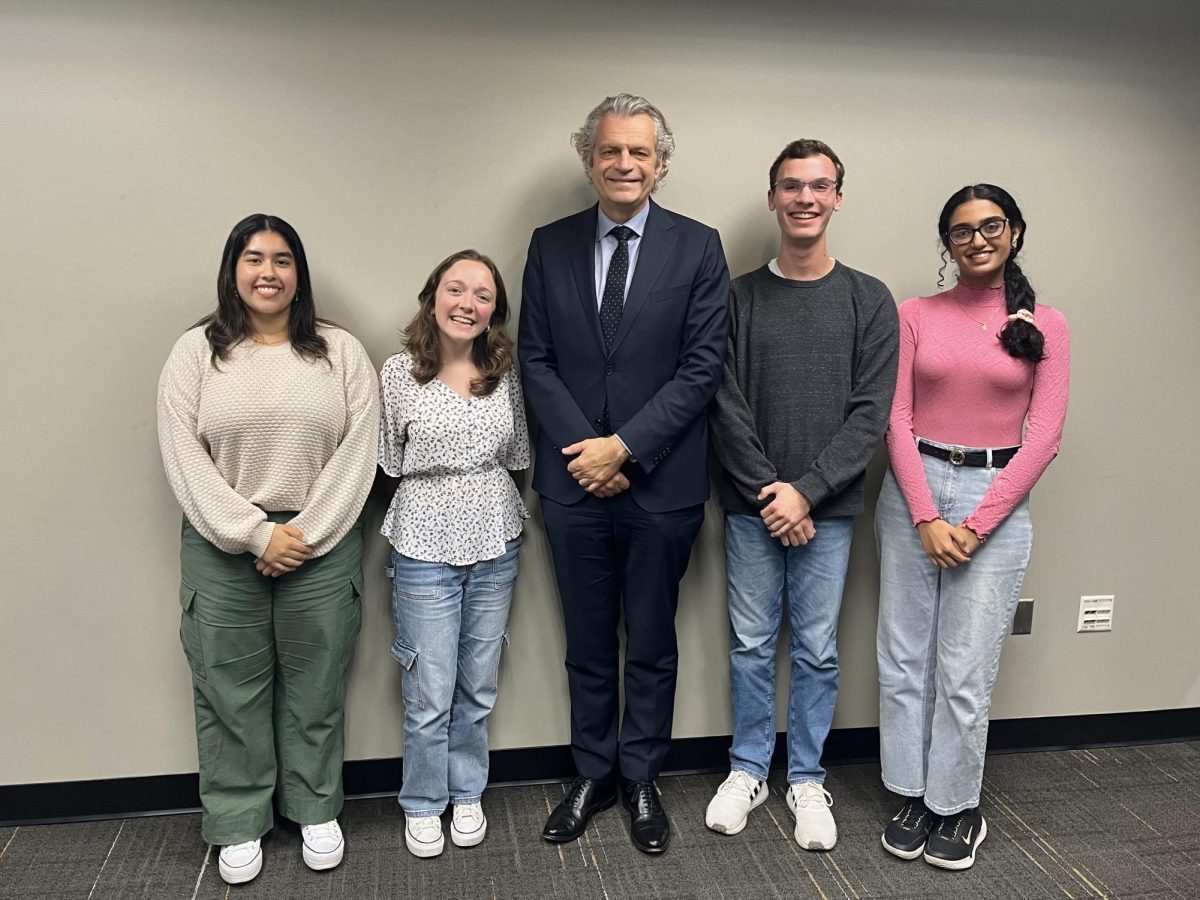

Jimbo • Feb 18, 2022 at 6:49 pm CST
Let’s take this issue to another level. Since the VU campus and medical center rely on fossil fuels for heating, cooling and electrical power, demand the administration shutdown the power plant and substation and cease all food and medical supply deliveries.
Alumni who will NOT be donating • Feb 16, 2022 at 5:36 pm CST
SHAME on whoever authored the administration’s response! Students being scared for their future is not a publicity stunt, full stop.
Trustees: hold the anonymous coward who wrote that responsible – then do your job and meet with the young adults who pay your salary.
Business Analyst • Feb 16, 2022 at 2:37 pm CST
“We take our fiduciary responsibilities seriously”? What a joke. No one in their right mind would put $500 million of their own money in an industry that will be the fraction of the size it is now within a few decades. There’s a reason $40 T of institutional assets have started to do so.
Regardless of climate change, Vanderbilt should begin the process of phasing out its fossil fuel investments purely for financial reasons. Chancellor Diermeier should enact divestment as an opportunity to rebuild his image and show that he truly believes in “open debate” and “changing your mind”.
Oliver • Feb 16, 2022 at 12:33 pm CST
Excellent in every way. Remember, these investments and policies are the work of former chancellor Zeppos, who never let ethics stand in the way of profit. Check out the extraordinary fossil-fuel connections of big donors and the Board of Trust–